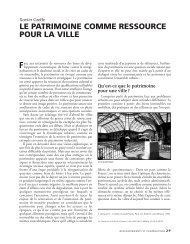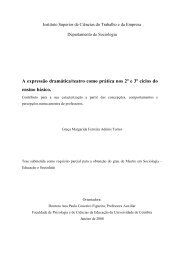BALANCING FAMILY AND WORK ROLES : EXPECTATIONS OF ...
BALANCING FAMILY AND WORK ROLES : EXPECTATIONS OF ...
BALANCING FAMILY AND WORK ROLES : EXPECTATIONS OF ...
You also want an ePaper? Increase the reach of your titles
YUMPU automatically turns print PDFs into web optimized ePapers that Google loves.
Indeed, Portugal in comparison with other European countries has the lowest level ofpublic equipment for childcare and domestic support. At home, Portuguese women areresponsible for most of the domestic affairs and the more demanding ones.In fact, nowadays, women are still educated in ambivalence : during the school years,they are asked to compete and prepare themselves for a more competitive work market,but, as they approach adulthood, they are also asked to moderate or renounce those valuesand assume other home and family oriented values which are more recognized by thesociety. Recent Portuguese studies have found that almost all young adults are in favor ofequality between men and women, but agree that women should be more involved indomestic tasks such as taking care of children. Their opinion about feminine specializationin reproductive tasks is clear and very traditional, as they revealed that women should givemore importance to her family role than to her professional career (Amâncio, 1994 ;Bardwick & Douvan, 1990 ; Inglez, 1996 ; Vasconcelos, 1998). From a very traditionalperspective, men will be more concerned with their own career, professional mastery andinvolvement than with the career of their partner, while the opposite is expected for womenwho value more highly family and conjugality. The self-perception of professionalcompetence and capability to be an adequate provider for the family is expected to be moreimportant for men than women.Thus the balance of family/domestic and professional/work roles remains asymmetricalfor men and women. The work and home spheres are sequential for men and simultaneousand permeable for women. It is known that a housewife’s time is continuous, without anydifferences between work and leisure, between working days and weekends or holidaysreferences. No difference is expected for the working female graduates but the duplicationof the demands (Inglez, 1996 ; Pleck in Duxbury & Higgins, 1991).Faced with such a social transformation, the construction of gender role by women ismore complex and three kinds of scenario have been identified in previous research(Amâncio, 1994 ; Costa, 1991).A minority of women, from a counter-normative perspective shares the first scenario,which was dominant in previous generations. In this scenario, women assume the« traditional » values of marriage and family and some young women discouraged by theirmothers’ double burden in the work and family context will assume a different pattern fortheir own lives. Their claims of independence and equality are based on their right to bedifferent and to reject the exclusive value of professional work. However, most women feeldiscouraged by the lack of social recognition of the value of family and marriage. Some ofthem react by assuming an image based exclusively on work competence, while othersassume the double role in family and work.The second scenario invokes the need of women to achieve their own independencethrough investment and success, especially in the work field. The main conception of thisrepresentation for women is considered closer to that of men involving characteristics suchas autonomy, activity, competition, and a greater need of achievement, which implies rights,privilege and a new identity for women. These women usually do not give much value tofamily and marriage projects and, when they assume these projects, they do it later in theirlife.3 http://aifref.uqam.ca – Actes du VIIIe Congrès de l’AIFREF
















